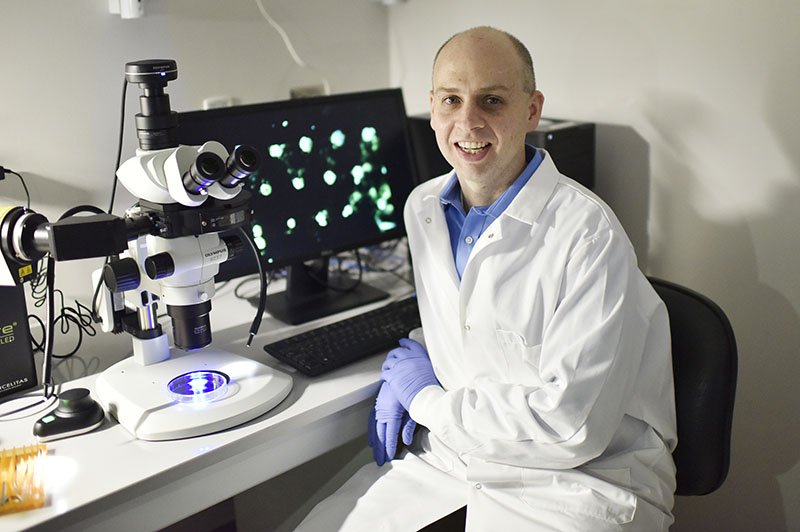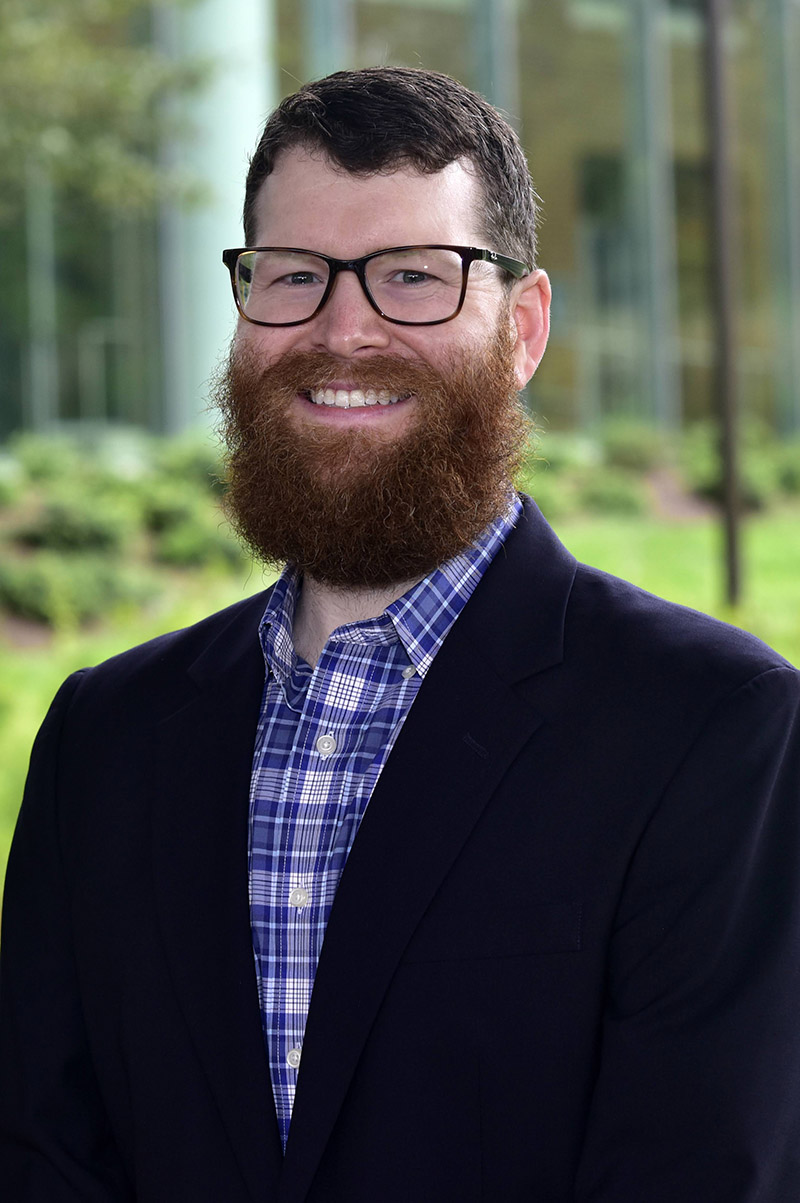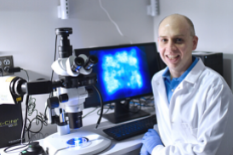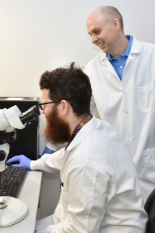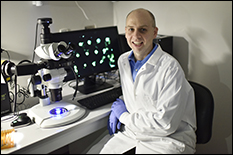News Story
Jewell Lab Teams up with Veterans Affairs to Advance Multiple Sclerosis Research

Fischell Department of Bioengineering Assistant Professor Christopher Jewell and members of his Immune Engineering Lab are teaming up with the U.S. Department of Veterans Affairs and the University of Maryland School of Medicine to further investigate new techniques to treat multiple sclerosis (MS) and other autoimmune diseases.
Jewell and his team have been researching ways to “turn off” the harmful immune attack that occurs during MS, while leaving healthy functions of the immune system intact. To do this, they are working with specially designed nanoparticles they hope will reprogram how the immune system responds to self-cells in the central nervous system (CNS) during MS.
In MS, the immune system incorrectly recognizes components of the CNS, causing inflammation and destruction of myelin, the fatty substance that surrounds and protects nerve fibers. When this happens, nerve fibers and cells are damaged, leading to loss of motor function and other complications.
Current therapies for MS broadly decrease the activity of the immune system, but at a cost that leaves MS patients vulnerable to infection. In searching for a way to decrease the harmful aspects of the immune system without eliminating the immune system’s helpful functions, Jewell and his team found inspiration in an unexpected source – how our bodies respond to infection. Surprisingly, new studies show that some of the defense mechanisms – toll-like receptors (TLRs) – we normally use to fight infection go haywire during autoimmune disease and are, in fact, over-active. Jewell and his team decided to target these pathways to block inflammation with the hopes that eliminating these harmful cues while immune cells develop might help promote a special kind of immune cell, called regulatory T cells, which control MS or other autoimmune diseases more specifically.
In recent years, biomaterials and polymers have been intensely studied as carriers for therapeutics because they offer advantages such as controlled release of therapeutics, targeting, and “cargo” protection. But, many common biomaterials exhibit intrinsic properties that can activate the immune system in unintended or unexpected ways. This means that, even if one knows what to expect from a certain vaccine, delivering these drugs in biomaterials might alter the immune response, sometimes in positive ways, and sometimes in a manner that could be detrimental. In one research area, the Jewell Lab is working to understand these interactions, but they are also taking a different approach to combat this challenge: Jewell and his researchers have successfully developed polyelectrolyte multilayer (PEM) vaccine coatings built entirely from immune signals. These immune-PEMs (iPEMS) are self-assembled on nanoparticle templates during production. Then, the templates are dissolved to leave hollow micro- or nano-capsules that consist only of the cues that the lab wants to deliver.
“Building capsules entirely from immune signals offers some unique advantages for the treatment of autoimmune diseases, such as MS,” Jewell said. “Typically, if a polymer particle is loaded with a drug for purposes of a vaccine to treat disease, most of what the patient gets is the carrier itself, while only a small portion of the vaccine consists of the therapeutics to treat the disease. Instead, our lab has developed a way to build a nanostructured capsule entirely of the immune signal, thus eliminating the need for the carrier particle and providing a simple modular system to deliver high concentrations of each cargo in tunable ratios.”
As such, Jewell and his team call these capsules “carrier-free” vaccines and immunotherapies.
“Many of the polymers being studied for use in human drug and vaccine delivery, by themselves, can activate immune pathways,” Jewell explained. “This is often good for vaccines because the goal is to ‘turn on’ the immune system to ward off a virus. But, in cases of autoimmune disease, this ‘turning on’ of the immune system could cause inflammation that makes the disease worse if not carefully understood.”
One of these other challenges Jewell says is that “existing therapies block immune function non-specifically, which is helpful for patients because malfunctioning cells, for example, might have limited ability to enter the brain and attack myelin. However, healthy immune cells also might not be able to enter to fight an infection, so patients can be left immunocompromised.”
With this in mind, the lab’s goal is to fine-tune therapeutics to avoid a general “shutdown” of the immune system, while blocking incorrect attacks against myelin. To test this idea, the team built iPEMs from myelin peptides and special DNA molecules that temporarily block TLR signaling. In a recent report in ACS Nano, the approach completely prevented disease in a mouse model of MS, and in collaboration with Dr. Walter Royal of the Department of Veterans Affairs’ Multiple Sclerosis Center of Excellence-East, iPEMs controlled inflammation in samples from human MS patients. Jewell says that “While in the early stages, this approach could provide a simple, modular platform to better understand, and perhaps exploit, the role of TLR signaling in autoimmune disease.”
Fischell Fellow Lisa Tostanoski served as lead author of the paper. AAPS Graduate Fellow and Dean’s Dissertation Fellow James Andorko (BIOE), National Institutes of Health postdoctoral fellow Dr. Yu-Chieh Chiu, Jewell Lab manager Dr. Xiangbin Zeng, and BIOE postdoctoral associate Dr. Peipei Zhang are co-authors of the paper, along with the University of Maryland School of Medicine’s Dr. Ming Guo, and Dr. Walter Royal of the Veterans Affairs’ Multiple Sclerosis Center-East.
Published November 29, 2016
